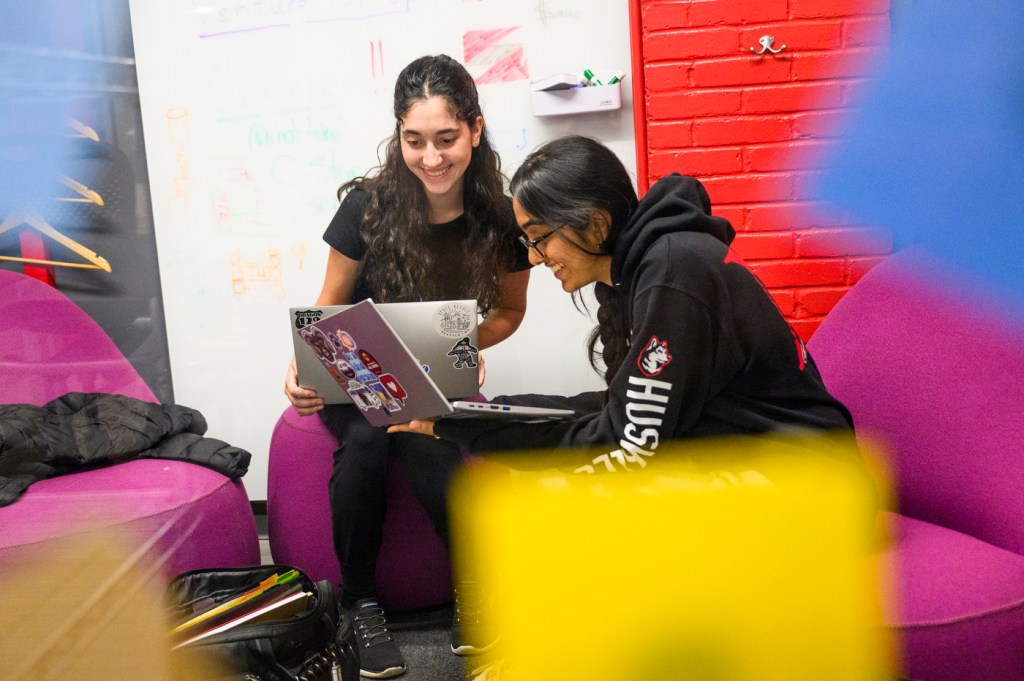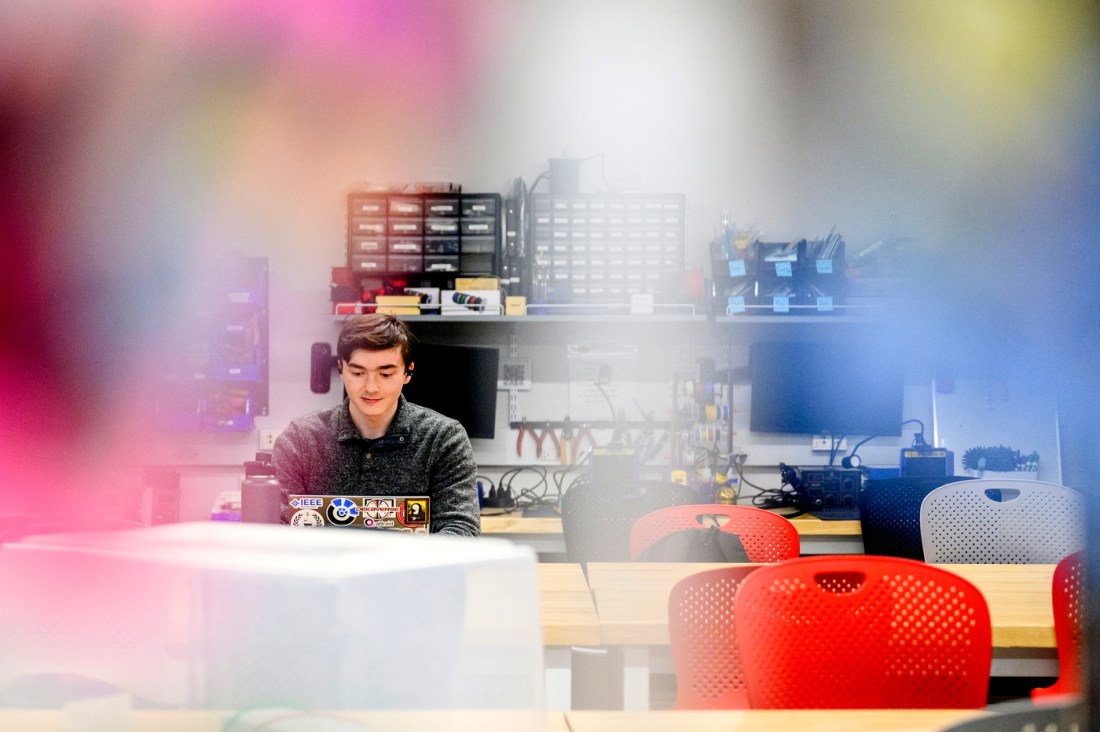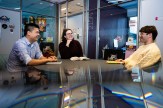Budding entrepreneurs flourish in Northeastern’s Sherman Center full-time co-op program
The Sherman Venture co-op allows students to spend a semester developing a business and has launched several successful enterprises.

When Madison Rifkin was 12, she came up with the idea for a bike with a lock built into its frame so riders wouldn’t have to worry about forgetting one. She received a patent for the device and came to Northeastern and minored in engineering with the goal to learn how to build this lock.
But as with any business, Rifkin’s venture, Mount, evolved over time from a bike lock into a scooter lock into a travel app to help people find hidden gems, one that she runs today full time. Luckily, she had the time, space and funding to explore these avenues through the Sherman Venture co-op.
The Sherman Venture co-op allows budding entrepreneurs at Northeastern University the chance to work on a new or existing business idea full time. The six-month, paid co-op is offered through the Michael J. and Ann Sherman Center for Engineering Entrepreneurship to undergraduate and graduate students with a business concept that’ll address a specific market need.
Several students are chosen each semester to spend all their time working on whatever they determine to be their business needs.
“The (Sherman Venture Co-op) showed me what it was going to be like to work for myself,” Rifkin said. “It allowed me to test that out before the stakes were a lot higher post-graduation (and) to really learn how to be my own boss, manage my own time and get to a place where this startup could be operational full time. The Sherman Venture co-op allowed for all of that trial and error.”
Students in the co-op are able to spend their day not just working on their products, but taking meetings and working in their market. This means some students spend the semester outside Boston depending on what works for their venture.


Jack Burns, a current Sherman Venture co-op and fourth-year business administration student, is spending his semester in Milwaukee working on Ketchup, Please, a company he co-founded in 2019 with his friend Evan Lampsa. The company’s mission is “to foster a healthier and happier America, one bottle of ketchup at a time.”
Ketchup, Please has two versions of ketchup that are sold in 400 retailers in the Midwest.
“Being based in Wisconsin and where all of our retailers are is really helpful,” Burns said. “To be able to travel within your home market has been really great. A lot of us were already doing this before the co-op, so it’s really allowed us to take a step back from those other responsibilities, really dive in full time to our own ventures, and seeing where we can take it.”
Not every venture has to be a traditional business. Some are, like Burns or Ashleigh Chiwaya and Naomi Barrant, third-year students currently on the Venture co-op and working on creating a vending machine that sells products for students with curly or coily hair that often aren’t available in other local stores. But Join Cheng, a third-year music industry and communications studies student, is spending his co-op working on his music career.
“I’ve always had to double up, working as a student and working a part-time job, but I felt like I was at a point in my career where I had to take it full time to grow in the way that I wanted it to,” Cheng said. “A lot of opportunities that I get, like shows, tours and meetings with people within the industry, they’re not in Boston. So this venture just allows me to travel.”
The co-op also allows students to connect with other entrepreneurs and build a community among their fellow co-ops.
“Meeting people who have the same mindset of being an entrepreneur and being driven individuals helps a lot,” Cheng said. “When you’re alone working on your own venture, it gets pretty frustrating. But meeting people who are also starting on their own gives you a lot of perspective, not just in your own industry, but as an entrepreneur … just helps you be a better person and more informed about what to do as an entrepreneur, which I think is the whole point of the co-op.”
Rather than requiring students to come out of the co-op with a full-fledged business, the focus of the Sherman Venture co-op is for students to work on their professional development and mental and emotional health as an entrepreneur.
Featured Posts
Hanna Elzaridi, a business major who graduated in 2023, did the Sherman Venture Co-op her junior year with her best friend/roommate. The two had the idea to make a machine that could be placed in gyms and would dispense protein powders in different flavors, inspired by their struggle finding space to store large tubs of protein powder in their dorm.
The duo bought a vending machine off Craigslist that they were able to store and work on in the Sherman Center’s makerspace. At the time, Johnson brought up the co-op. The two applied and ended up getting accepted for the program in spring 2022.
After getting help from mechanical engineering students, they ended up launching their machine at Marino Recreation Center.
“It was honestly like an incredible opportunity,” Elzaridi said. “We were already housed within the Sherman Center makerspace with our machine, but just the opportunity to be able to work on the idea full time and just have the control over our schedule and really experience like being business owners was such a cool experience.”
Elzaridi has gone on to work at a law firm and put her venture on pause, but said her experience doing the co-op makes her stand out in interviews and helped her learn time management and leadership.
“The experience that we had building it and seeing it come to life was honestly like one of the highlights of my undergraduate experience,” she said. “It taught us so much. Honestly, those six months were very, very important. I use those skills to this day.”
While launching a full-time business isn’t necessary for a successful Sherman Venture co-op, it can be an excellent way for students to end up on that path. Yoshua Rozen, a 2018 Northeastern graduate, was part of the second cohort of Sherman Venture co-ops in 2017. While on co-op there, Rozen laid the groundwork to launch Partrunner, a company dedicated to connecting operators and small fleet owners with distributors and manufacturers.
Rozen now runs Partrunner full time. The company recently expanded to doing business in Mexico and has also worked with companies like Amazon and Walmart.
“The Sherman Venture co-op was key to develop mentors,” Rozen said. “Theo (Johnson, director of the Sherman Center) was a guiding force. He’s now become a good friend of mine.”
Rozen said the Sherman Venture co-op also connected him with other programs at Northeastern that helped him with other aspects of his business, like creating the trademark.
“You take advantage of the whole ecosystem,” he said. “It was really foundational to everything that I did. If it wasn’t for that program, I wouldn’t be where I’m at today.”











